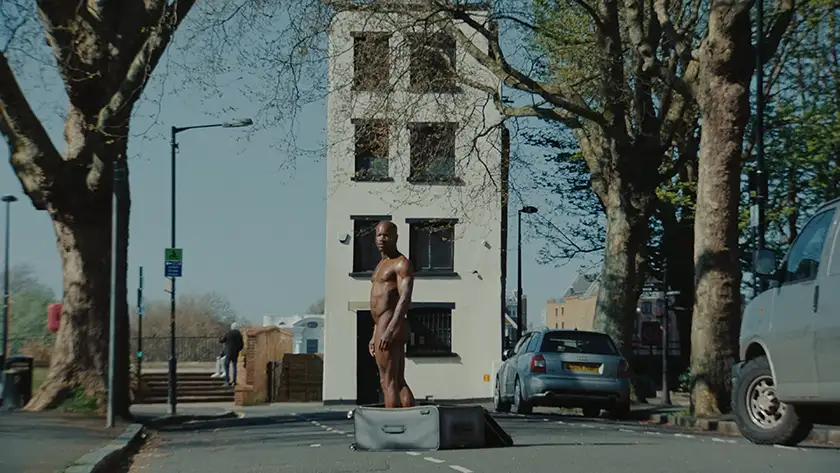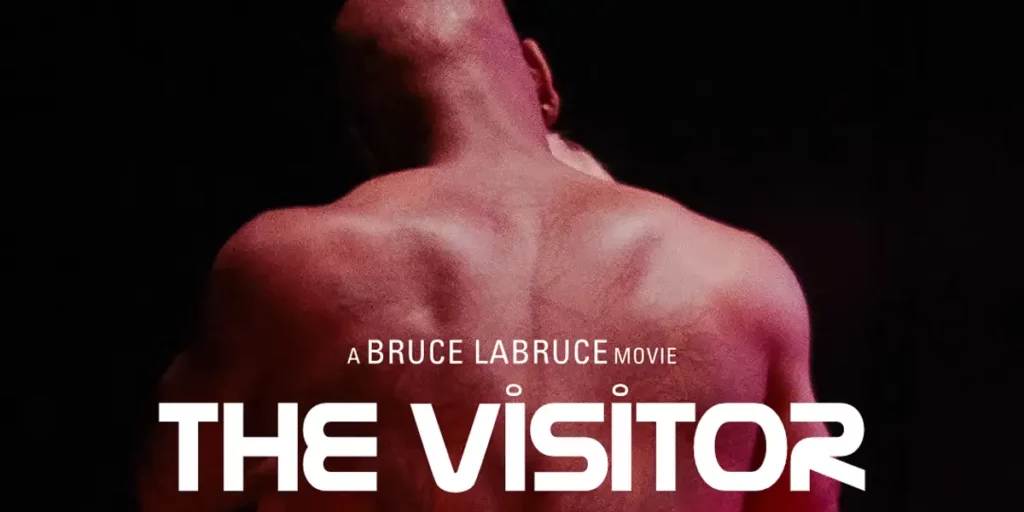Bruce LaBruce tackles immigration and sexual liberation in the Pasolini-inspired The Visitor, where an alien refugee heals an upper-class family.
Writer, director, photographer and artist Bruce LaBruce is known for his provocations. His movies are often sexually explicit, filled with religious symbolism, and revolve around various taboos that not many filmmakers would dare to approach. The first film of his I’ve ever seen was Gerontophilia (2013), about a boy who works in a nursing home and suddenly realizes he’s attracted to much, much older men. In Otto; or, Up with Dead People, neo-Goth zombie with an identity crisis decides to audition for a zombie movie. And recently, long before he made the Berlin-premiering The Visitor, he gave us the gem that was Saint-Narcisse, which premiered at the Venice Film Festival in 2020.
Telling the story of a young man who is attracted to his own image and one day discovers he has a twin, Saint-Narcisse pretty much contains every single taboo you can think of, from perverted priests to unusual fetishes and even twincest. And yet, I’ve always found LaBruce’s films hide incredibly relevant messages about human desires and fears, and the state of the world where we live. If you’re able to look past the absurdity and find the irony and emotion, you’ll discover real meaning behind his provocations, and that’s what has always drawn me to the Canadian filmmaker’s work.
But his latest film, The Visitor, is something else entirely. Inspired by Pier Paolo Pasolini’s Teorema (1968), the movie begins in an extremely promising way. As the camera pans along the shores of the river Thames, in London, a voice over (Adrian Bracken) utters familiar words. “As I look ahead, I am filled with foreboding,” the voice says, quoting Enoch Powell’s infamous “Rivers of Blood” speech, which sparked a debate about immigration and race in the UK back in 1968. But if Powell thought it was “literally mad to be permitting the annual inflow of dependants” who’d settle down into Britain, the voice worries about “dangerous aliens destroying families” instead.
The camera settles on a tent from which a homeless man (John Foley) emerges; he soon finds a suitcase floating in the river. Soon, a handsome Black man starts to emerge from it, and flashes of bright yellow and red fill the screen, accompanied by disquieting electric sounds and images that speed up and slow down in an unnatural way. As the man – the titular Visitor (Bishop Black) – gets out of the suitcase and stands up, completely naked, we hear the church bells ring. And just like that, we have no doubts that we’re watching a Bruce LaBruce film, immersed in a universe where mythology, religion, sex, and politics collide.
And in the best Bruce LaBruce tradition, all these themes come alive with gorgeous visuals to draw us into an alien world that’s not that different from our own. From the very first minutes, it’s immediately clear that The Visitor is a political statement, where LaBruce uses sexual liberation as a means to fight xenophobia and racial hatred, and to cement one’s identity.

The story itself reflects that of Teorema: a visitor arrives at the house of an upper-class family and seduces every family member: The Father (Macklin Kowal), The Mother (Amy Kingsmill), The Daughter (Ray Filar), and The Son (Kurtis Lincoln). In a statement on production company a/political’s official page for the film, LaBruce explains his desire to “put your Marxism where your mouth is and make the movie sexually explicit, or even better, pornographic,” and that’s exactly what he does. And his political statement is just as explicit as the actual sex scenes, with writings such as “make (revolutionary) love not (colonialist) war,” “sexual anarchy in the UK,” and “open borders, open legs” brightly filling the screen in between these shots.
It’s a revolutionary movie, in the sense that it subverts what we’re used to seeing in film, in more than one way. First of all, there’s the combination of extremely explicit sex scenes with soft, pastel coloured shots that elevate the material, portraying the characters and what they do as art of the highest level. And then, the fact that The Visitor, a queer refugee, heals the family by means of sexual acts is even more significant, as this subverts the stigma that associates refugees with sexual violence, and conveys LaBruce’s message of acceptance even louder.
It’s an extremely fascinating premise, and on a symbolical and technical level, it absolutely works. At the same time, I also couldn’t help but find the film so experimental and intentionally alienating that, after those first intriguing minutes, it became quite a tiring and, at times, even disturbing watch for me. There’s a scene when the Visitor arrives at the house, welcomed by the Maid (Luca Federici) – a clear reference to Pasolini’s Salò – where I was on the verge of throwing up because of what happens at the dinner table. The sex scenes that follow are beautifully shot, with great sound design and cinematography, but they also become repetitive after a while. The most transcendent sequences at the end are surprisingly poetic, but I also wished the film overall had been a little shorter.
When I was researching the movie, I discovered that The Visitor was initially presented as an exhibition at a/political’s gallery in London, with short clips from the movie showcased in various spaces that also contained LaBruce’s statements, and part of me wonders if the exhibition medium might have been the best way to present the film all along. But even if I’m not the right target audience for this film – as I tend to appreciate LaBruce’s more plot-heavy works more – I also can’t help but admire what LaBruce did in The Visitor, not only thematically and in terms of the filmmaking itself, but also for what the movie stands for and for the wonderfully diverse, talented queer cast involved in the project. If you’re in Berlin and decide to check out The Visitor – and I have no doubts that fans of LaBruce’s most explicit work will find a lot to enjoy here – go on an empty stomach.
The Visitor had its World Premiere at the 2024 Berlin Film Festival and will have its UK premiere on January 11, 2025 at an undisclosed location in London: tickets via Vice. Read our review of Saint-Narcisse!

